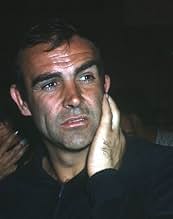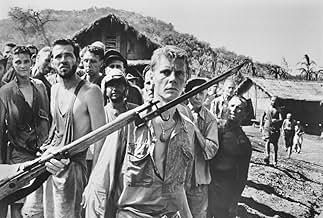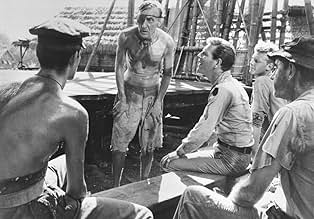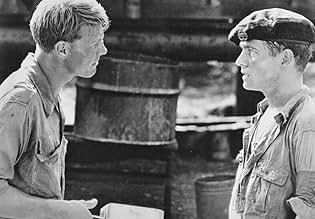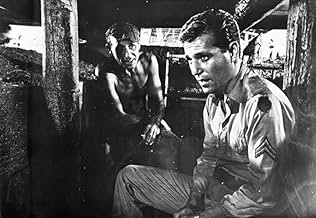IMDb-BEWERTUNG
7,5/10
5341
IHRE BEWERTUNG
Füge eine Handlung in deiner Sprache hinzuFast-talking wheeler-dealer Corporal King is stuck in a Malaysian P.O.W. camp during World War II and uses bribery and larceny to take de-facto control of the camp.Fast-talking wheeler-dealer Corporal King is stuck in a Malaysian P.O.W. camp during World War II and uses bribery and larceny to take de-facto control of the camp.Fast-talking wheeler-dealer Corporal King is stuck in a Malaysian P.O.W. camp during World War II and uses bribery and larceny to take de-facto control of the camp.
- Regie
- Drehbuch
- Hauptbesetzung
- Für 2 Oscars nominiert
- 3 Nominierungen insgesamt
Joe Turkel
- Dino
- (as Joseph Turkel)
Michael Stroka
- Miller
- (as Mike Stroka)
Empfohlene Bewertungen
I saw this movie again recently and had forgotten how great it was. It shows how people behave towards each other when the thin veil of civil society is torn away.In a brilliant performance, George Segal plays the wheeler-dealer 'King Rat, a cynical hustler whose only real interest is himself. His counterparts in the Japanese POW camp are the British officers who seem to maintain the rules and courtesies of civilized life. As the movie, unfolds, though, we see the senior officers using their position to steal food from the lower ranks. Even the British provost marshal, or camp policeman (another great performance by Tom Courtenay), is shown to be a weak character, vengeful and sanctimonious, who must believe in retribution to bolster his fragile ego.
'King Rat's' one true friend in the camp is played by James Fox. But the Segal character can't really be a friend to anyone. One of the prices of cynicism is emotional shallowness. In the end Segal tells his best friend - 'You worked for me, I paid you a few bucks, that's all there was between us.' The film makes it clear that the action applies to the wider world. Unlike the other prisoners, the Segal character is neither shocked nor excited by liberation. To him, the everyday world is as pitiless as the POW camp.
'King Rat's' one true friend in the camp is played by James Fox. But the Segal character can't really be a friend to anyone. One of the prices of cynicism is emotional shallowness. In the end Segal tells his best friend - 'You worked for me, I paid you a few bucks, that's all there was between us.' The film makes it clear that the action applies to the wider world. Unlike the other prisoners, the Segal character is neither shocked nor excited by liberation. To him, the everyday world is as pitiless as the POW camp.
It has always bothered me that King Rat is so underrated. On one list of top the thousand films in history, it gets no mention. I think it's because George Segal's character, Corporal King wasn't a totally likable person. He is not the standard Hollywood hero. But he is a hero of mine. Were I in that prison camp, I guarantee you, I would have been Corporal King's best friend. One thing I learned in life was how to survive, and everyone around Corporal King survived. The movie misses a very important point that was in James Clavell's novel on which it is based. In case the war turned bad for the Japanese and they started taking revenge on the prisoners, King had planned an escape route. Not just for himself, for everyone close to him. Put that in the film and you've got a major American hero. The movie is totally cliché free. One never knows where it is going or how it is going to end. Winning the war, you see, will not guarantee the safety of the prisoners. How it ends is perfectly logical in retrospect, but difficult to predict. It is a near perfect motion picture.
I saw this grainy black and white film sometime in 1967 one steamy evening in a tin hooch Army movie theatre at TSN airfield on the outskirts of Saigon. The movie was punctuated by the sounds of mortars on the perimeter and the occasional flash from an aerial flare. I never forgot it. It rang true there. So true that no-one could say a word after. We just got drunk -- as usual. I haven't talked to many others who saw this movie. It hit right in the middle of the rising tide of despair over Vietnam. And since it wasn't actually an anti-war movie, I think it went nowhere. I believe it's origin is a short novel, possibly autobiographical by J.B. Clavell, author of Tai Pan and other sagas set in the 19th C orient. No matter what George Segal has done since, I have known that he has the heart of a rat. His King was a natural ruler in a perverse state of nature -- and his fate the fate of all maverick rulers in the end. If you can find it and see it, it will take on the character of a lost dream.
This film, the best of 1965, was tough and disturbing and seriously under-rated. Great performances and a haunting soundtrack. George Segal, one of the best actors of the 60's and 70's creates an insidious yet charming character who runs things in the camp. James Fox (excellent actor who quit for many years on some kind of spiritual journey) is superb as is Tom Courtney and even Patrick O'Neal (who has never been impressive in any other film I can think of) delivers a punch as Max the stooge.
Bryan Forbes created a somber world of dog eat dog that should have been up for a host of awards. Throw in John Mills, James Donald and other familiar faces and you have a near-classic. A 9 out of 10. Best performance George Segal. Well worth your time.
Bryan Forbes created a somber world of dog eat dog that should have been up for a host of awards. Throw in John Mills, James Donald and other familiar faces and you have a near-classic. A 9 out of 10. Best performance George Segal. Well worth your time.
We all wonder what happens when we die, this movie is about what happens when we live at any cost, put in the context of a Japanese prison of war camp in WWII. A serious film with enough action to keep it alive while delivering a message. You won't be bored.
George Segal plays his greatest role, tough, smart, without shame. How he became a banjo player I don't know. (jmho)
George Segal plays his greatest role, tough, smart, without shame. How he became a banjo player I don't know. (jmho)
Wusstest du schon
- WissenswertesDue to the cast, director and setting, this is often assumed to be a British movie, but it was entirely filmed in California.
- PatzerThe shoulder patch that Cpl. King (George Segal) is wearing is that of the 34th Infantry Division (Red Bull). The 34th ID served in the European Theater of Operations, not in the Pacific. The 34th ID patch is a black Mexican water jug called an "olla" with a red bull's skull superimposed. Almost all the POWs at Changi were British or Commonwealth soldiers captured at the surrender of Singapore on Feb. 15, 1942, but there also were POWs from the Netherlands East Indies, which surrendered in March. The only sizable U.S. unit at Changi was Co. E, 2nd Btn, 131st Field Artillery Regt., part of the Army's 36th ID (the "Texas Division"). The Second Battalion, which became known as the Texas National Guard's "Lost Battalion," was detached from the 36th ID in the States and shipped to the Pacific in November 1941, but when the Japanese attacked the Philippines in December, the battalion's convoy was diverted from Manila to Brisbane, Australia. In January the battalion was sent to Java, in the Netherlands East Indies. The battalion was the only U.S. ground unit in Java when the NEI surrendered to the Japanese on March 9, 1942. Most men in the battalion were transferred to Singapore later that year and, along with thousands of British and Commonwealth soldiers, were used by the Japanese as slave labor to build the infamous "Death Railway" connecting Bangkok to Rangoon. Company E of the 2nd Battalion, separated from the rest of the unit on Java, was at Changi briefly in October-November 1942 before being sent to Japan as slave laborers. It would be plausible that Cpl. King was a member of 2nd Battalion, 131st Field Artillery, and that the movie's costumers got the wrong division patch for his uniform.
- Crazy Credits[Prologue] This is not a story of escape. It is a story of survival.
It is set in Changi Jail Singapore, in 1945
The Japanese did not have to guard Changi as a normal prison of war camp. The inmates of Changi had no friendly Swiss border or any other neutral country within reach. They were held captive not so much by high walls, or barbed wire, or machine-gun posts, but by the land and sea around them - and the jungle was not neutral, nor was the ocean.
They did not live in Changi. They existed. This is the story of that existence.
- VerbindungenFeatured in A Walk on the Moon (1999)
- SoundtracksAdeste Fideles
(uncredited)
Written by Frederick Oakeley (1841)
Variation sung in distant background by POWs
Top-Auswahl
Melde dich zum Bewerten an und greife auf die Watchlist für personalisierte Empfehlungen zu.
- How long is King Rat?Powered by Alexa
Details
- Laufzeit
- 2 Std. 14 Min.(134 min)
- Farbe
- Seitenverhältnis
- 1.85 : 1
Zu dieser Seite beitragen
Bearbeitung vorschlagen oder fehlenden Inhalt hinzufügen


